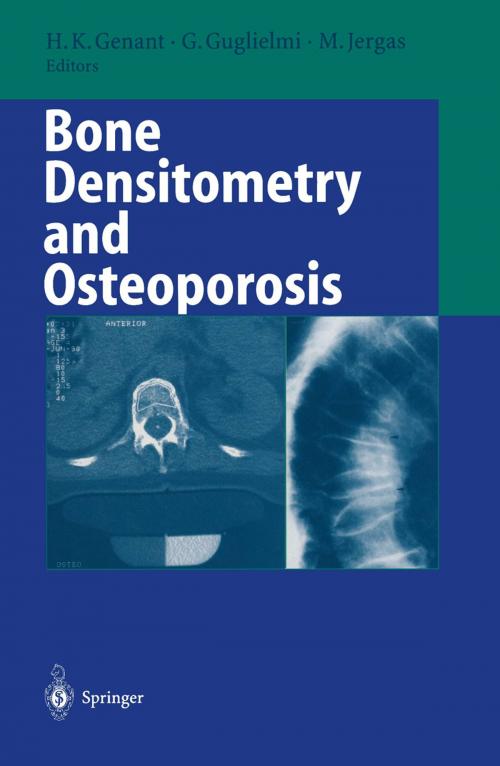Bone Densitometry and Osteoporosis
Nonfiction, Health & Well Being, Medical, Medical Science, Biochemistry, Allied Health Services, Radiological & Ultrasound| Author: | ISBN: | 9783642804403 | |
| Publisher: | Springer Berlin Heidelberg | Publication: | December 6, 2012 |
| Imprint: | Springer | Language: | English |
| Author: | |
| ISBN: | 9783642804403 |
| Publisher: | Springer Berlin Heidelberg |
| Publication: | December 6, 2012 |
| Imprint: | Springer |
| Language: | English |
The diagnosis of osteoporosis and the determination of fracture risk has always been a challenge for radiologists, epidemiologists, and clinicians as well as oth er researchers and health care professionals working in the field. It is bone min eral density that is closely related to bone fragility, and the advent of techniques to quantitatively assess bone density has been welcomed. It has reduced the sub jectivity inherent to conventional radiologic assessment of osteoporosis. The on going technical process has made various techJ)iques to assess bone density wide ly available. However, these measurement techniques have also incurred some crit icism because bone densitometry has sometimes been applied without specific indications and without appropriate clinical ramifications. The purpose of this text is to provide a perspective on the current status of bone densitometry and ist relevance to osteoporosis diagnosis and management. Therefore, this book will give the reader an introduction to the nature of osteo porosis, its pathophysiology and epidemiology, and the clinical consequences of performing bone densitometry. Aside from standard bone densitometry, newer technologies such as quantitative ultrasound techniques, magnetic resonance imaging and bone structure analysis are discussed in the context of diagnosing osteoporosis.
The diagnosis of osteoporosis and the determination of fracture risk has always been a challenge for radiologists, epidemiologists, and clinicians as well as oth er researchers and health care professionals working in the field. It is bone min eral density that is closely related to bone fragility, and the advent of techniques to quantitatively assess bone density has been welcomed. It has reduced the sub jectivity inherent to conventional radiologic assessment of osteoporosis. The on going technical process has made various techJ)iques to assess bone density wide ly available. However, these measurement techniques have also incurred some crit icism because bone densitometry has sometimes been applied without specific indications and without appropriate clinical ramifications. The purpose of this text is to provide a perspective on the current status of bone densitometry and ist relevance to osteoporosis diagnosis and management. Therefore, this book will give the reader an introduction to the nature of osteo porosis, its pathophysiology and epidemiology, and the clinical consequences of performing bone densitometry. Aside from standard bone densitometry, newer technologies such as quantitative ultrasound techniques, magnetic resonance imaging and bone structure analysis are discussed in the context of diagnosing osteoporosis.















